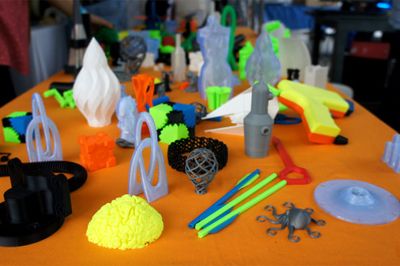By Liz Massey, Sept. 11, 2014.
Recently, I had an opportunity to visit a part of Arizona State University that my day job doesn’t typically take me — the institution’s Chandler Innoxvation Center.
As part of this eye-opening experience, I visited a “making and tinkering” camp for high school students and dropped in on TechShop, a 15,000-square-foot workshop that provides its members access to more than $1 million worth of tools and equipment.
From 3-D printers and industrial-strength metal cutters to commercial quilting machines and a full woodshop, the center is a do-it-yourselfer’s paradise
The center is a major Valley gathering spot for our local “Maker Movement.” Over the past decade, the United States has seen an explosion in the number of events and groups focused on helping individuals create the products they desire, instead of waiting for a manufacturer to design and build them.
Many are excited about the Maker Movement, and some are hopeful that it will help resolve our gap in science and technology education or spur greater innovation in business.
I believe the LGBT community can also learn something from Makers, as we have seen demand for some of the institutions that we built ourselves dry up as mainstream society has become more accepting.
From World War II to the mid-1990s our community was marked by an energetic do-it-ourselves spirit — especially after Stonewall. In many cases, we built the institutions we needed — from feminist bookstores to LGBT-themed musical concerts — because outside businesses didn’t cater to “our kind.”
The drag and leather/kink groups were even more explicitly engaged in maker-like activities, creating props for performance numbers or play scenes and altering apparel to enhance its entertainment value or potential for personal enjoyment.
In the 23 years I’ve been out, I’ve seen exponential growth in gay-owned and gay-friendly businesses. It’s much easier to find the LGBT-specific goods we desire outside of the “gayborhood,” and that’s a great thing.
However, I do think that our tribe is also well served by retaining the can-do spirit that preceded our wider acceptance by society. It sustained us for generations, through multiple tragedies for our community, so I think it is worth encouraging.
To that end, there are several mottos popular in the Maker Movement that I think that LGBT people could benefit from adopting for their own personal use:
Create rather than consume.
Sure, we have amazing collective buying power, but our ability to make what we need, when we have to, is even more stunning.
Be comfortable not knowing.
We don’t know when there will be full marriage equality in the United States, or when the other hallmarks of full legal parity with non-LGBT people will fall into place. This motto teaches us to focus on what we can do now to bring it about.
Use familiar materials in unfamiliar ways.
Our ways of dressing, reading, consuming media and buying just about everything are evolving, thanks to technology and other forces. Exploring new ways of meeting age-old needs can be profitable and preserve the basics of what works in a situation.
Prototype rapidly.
Once an LGBT institution is “too big to fail” without serious repercussions for the community, it’s much harder to be nimble and change direction quickly. One way to test new ideas is seen in the concept of the “pop-up” — a temporary event/service/happening that exists to try out an idea’s popularity and staying power.
Express ideas through construction.
The translation of this motto in our community could be to consciously structure our institutions so they are living embodiments of our ideals. For example, if we value consensus, perhaps some initiatives should emphasize group decision making and buy-in/ownership over a top-down structure that exists simply because “every other organization does it that way.”
Being a Maker often means getting messy and making a lot of noise, and so does LGBT advocacy. One final way in which Makers and queer activists may come to understand each other is their sense of the importance of acting in the present.
As Dale Dougherty, founder of MAKE Magazine and creator of the MakerFaire DIY event series, wrote in an essay about the Maker mindset, “(Makers) do not wait until the future to create and make. They feel an urgency to do something now — or lose the opportunity to do it at all.”
